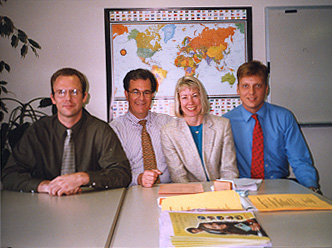 |
The International Studies and Programs staff at UNMC, from left, Dan Teet, Thomas Gouttierre, Sara Pirtle and Steve Daubendiek. |
UNMC’s International Studies and Programs department recently sponsored a luncheon to update deans, administrators and faculty members on current issues affecting international faculty and students at UNMC.
In continuing efforts to strengthen national security, Thomas Gouttierre, dean of International Studies and Programs at UNMC and the University of Nebraska at Omaha, said the Immigration and Naturalization Service (INS) and U.S. Department of State (DOS) have implemented several new procedures for tracking international students and scholars.
Among the policy changes since the Sept. 11, 2001, terrorist attacks:
- Since Sept. 1, most new Social Security applications from international students and scholars must be sent to the INS for clearance. This has lengthened the average time required to receive a Social Security number from less than 10 days to eight to 10 weeks.
- Under the International Student Exchange Authentication System (ISEAS), since Sept. 12, universities that invite international students and scholars must also enter applicant information on a DOS Web site before the new F-visa (student) and J-visa (scholar) applicants can be granted a visa at a U.S. consulate. This will help prevent anyone from receiving a visa by altering or duplicating official documents. The procedure is a prelude to the full implementation of the Student and Exchange Visitor Program (SEVP) and improves the reporting of information from universities to the INS and DOS to ensure compliance with regulations. This system will be in effect until Jan. 30, 2003, when the new Student and Exchange Visitor Information System (SEVIS) is implemented.
- By Jan. 30, 2003, the INS expects postsecondary institutions that enroll foreign students (74,000 in all, according to the INS) to comply with its new, computerized system for tracking international students. Through SEVIS, the INS wants to keep tabs on which applicants institutions accept, the dates on which they enter and leave the United States, and what they are doing while in the country. The primary focus is on monitoring the activities of foreign students.
“The rapid pace at which the INS is developing SEVIS is a source of worry for many university officials,” Gouttierre said. “Institutions normally need eight to 12 months to change their computer systems to meet new requirements. The INS has not yet finished drafting regulations that will govern SEVIS. For UNMC, compliance with the SEVIS regulations requires an additional investment of both time and finances.”
The new procedures mean that increased interface between International Studies & Programs and the registrar’s office will be necessary, as well as the purchase of new software that is SEVIS-compliant. All four University of Nebraska campuses are exploring the possibility of jointly purchasing the same software and saving costs. However, it is unclear whether it is feasible to have the entire university use one system.
In addition to making reports when students do something that affects their visa status, such as changing their major or address, institutions now have to update students’ files at the beginning of each term. If the INS does not receive an update, the student is considered “out of status” and can face penalties including fines and deportation. Institutions not compliant with SEVIS by the Jan. 30 deadline risk severe penalties.
“In spite of the new demands upon our universities, we want to keep all these changes in perspective,” Gouttierre said. “Even with the past year’s events, UNMC and UNO registered all-time high numbers of international students while higher education institutions experienced a decline overall.”
During the 2001-2002 school year, UNMC had 305 international students from 52 countries. UNO had 1,122 students from 98 countries.
“It’s not a stretch to estimate that these students contribute $15 to $20 million to the economy of greater Omaha,” he said. “I would like to believe that this positive news for UNMC and UNO is due to the excellent reputation of our institutions, the excellent service provided to our participants by student advising personnel, and the hospitable environment provided by the people of Omaha.”